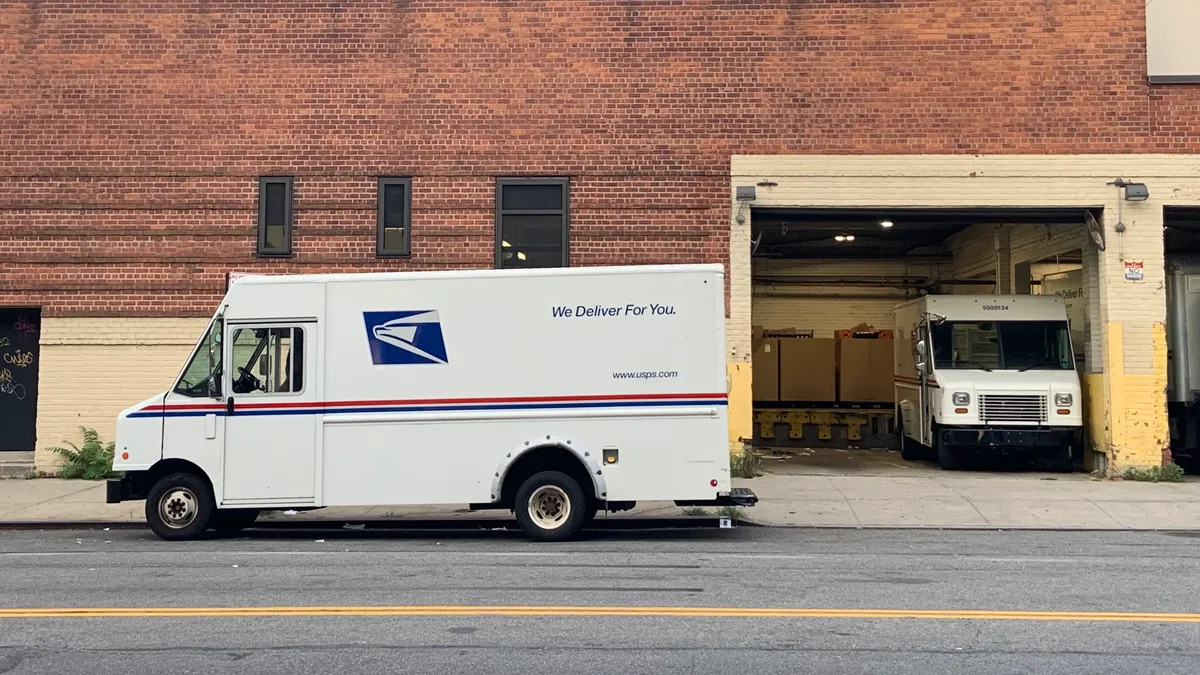Dive Brief:
- The U.S. Postal Service allegedly forced nursing employees to express their breast milk in unsanitary, uncomfortable and often public places, without giving them reasonable time to do so, three employees claimed in a July 21 collective action, Masseur v. United States Postal Service.
- Per the complaint, when one of the employees returned to work after giving birth, she was allegedly told she would have to pump milk in a break room where co-workers were present. Another was forced to pump milk in a cramped, hot, unlit and windowless space at the back of her mail truck, after supervisors allegedly told her that if she didn’t want to use a break room or locker room, she had to “figure it out” on her own. The third employee was initially told to use the locker room to pump milk, but her supervisor denied her request to hang a sheet for privacy; he also refused to allow her return to the facility to pump milk while she was delivering mail, forcing her to pump milk in her mail truck, the complaint alleged.
- The plaintiffs brought a proposed collective action against the USPS for violating the Fair Labor Standards Act and the Providing Urgent Maternal Protections (PUMP) for Nursing Mothers Act. “Instead of supporting breastfeeding mothers, Defendants’ practices forced those mothers into a Hobson’s choice between using demeaning, unsanitary spaces to express milk, abandoning pumping at work altogether, or quitting their jobs. Congress clearly declared in the PUMP Act that no mother should have to make such a choice,” the complaint said.
Dive Insight:
The FLSA requires employers to provide nursing employees with: 1) reasonable break time; 2) each time they need to express breast milk; and 3) a place to do so “other than a bathroom, that is shielded from view and free from intrusion from co-workers and the public,” according to the U.S. Department of Labor. The right extends for one year after a child’s birth.
Prior to the newly enacted PUMP Act, these protections were limited to employees entitled to minimum wage and overtime under the FLSA. The PUMP Act extends the protections to millions more workers, including those exempt from the FLSA’s overtime requirements — perhaps most notably adding this right for teachers, care workers and agricultural workers.
Compliance is a timely concern. As of the end of April, employers that violate the PUMP Act face steep penalties, such as liquidated, compensatory and punitive damages, according to a DOL fact sheet.
The USPS allegations highlights common compliance missteps that HR staff may want to address when training managers and supervisors on the law.
For instance, in addition to ensuring the nursing employee has a private space to express milk, the PUMP Act clarifies that the space must also be “functional” for expressing milk, the fact sheet explains. This means at a minimum, it must have a chair and a flat surface, according to U.S. Department of Health and Human Services guidance. The space should also be near running water so nursing employees can wash their hands and breast pump parts and be removed from chemical exposure, the HHS guidance notes.
USPS had many options for nursing employees who drove delivery trucks, the lawsuit alleged. Those included planning their route so they pass a location where they could pump, such as their residence or another designated space, or reassigning them to a stationary role with sufficient accommodations for pumping, the workers claimed.
Bathrooms aren’t permitted because breast milk is food and should be handled the same way other food is handled, the HHS guidance explains. “No one would be willing to prepare food in a bathroom, and that includes breast milk,” the guidance says.
Nursing employees who telework must be free from observation by any employer-provided or required video system, including a computer camera, security camera or web conferencing platform, the DOL fact sheet reminds employers.
Employers also must ensure workers have reasonable time to express milk, and supervisors and managers should refrain from retaliating against a nursing employee because of a request for time to express milk, the fact sheet warns. A USPS employee, for example, claimed that when she told her supervisor she couldn’t work on a particular task at a specific time because she would be pumping, the supervisor had her escorted out of the building.













